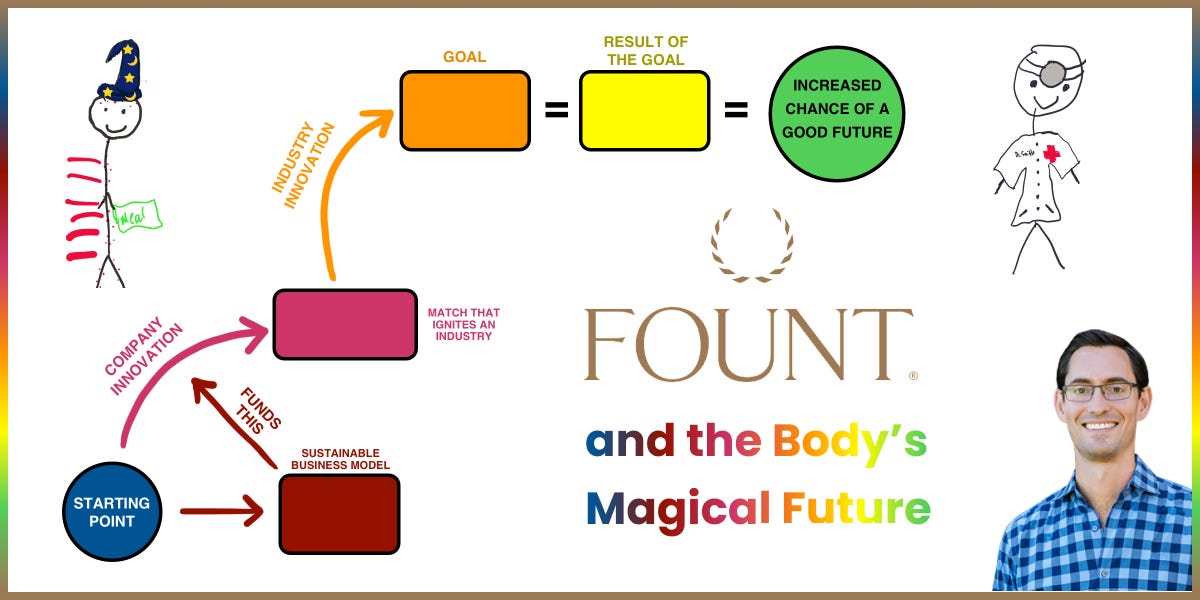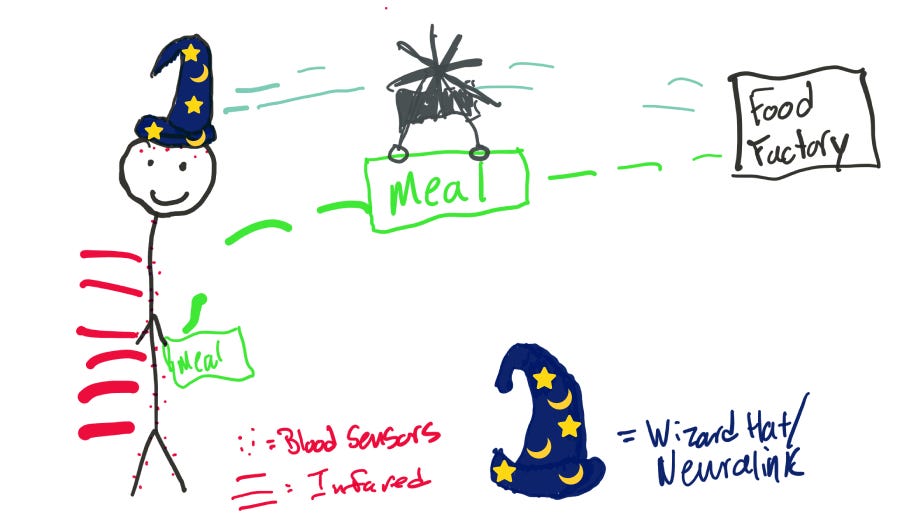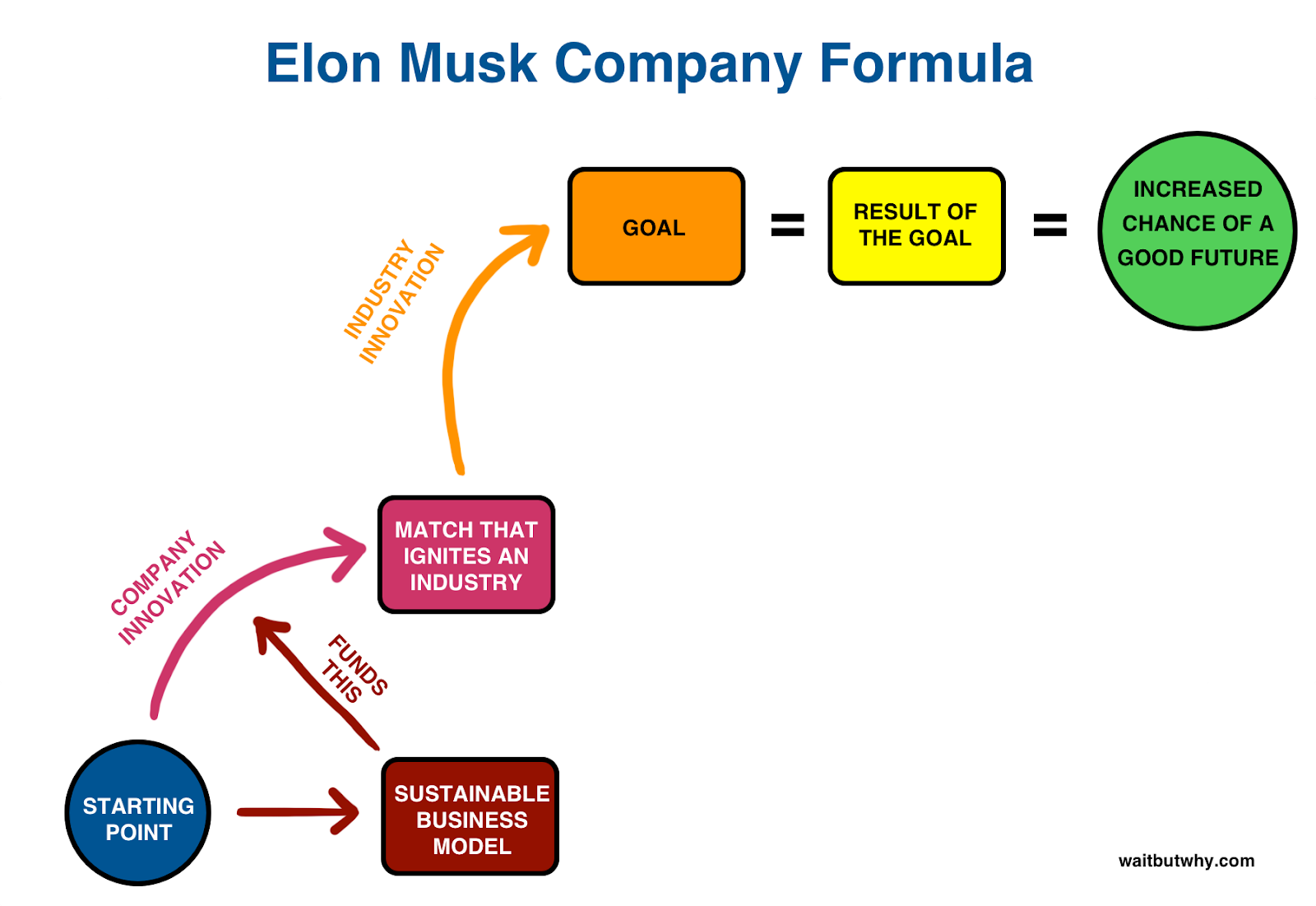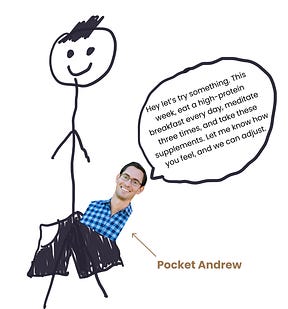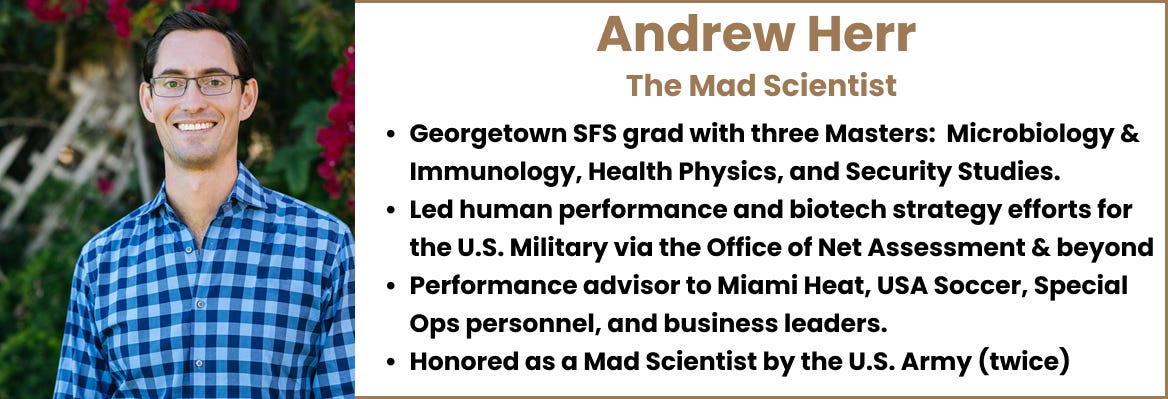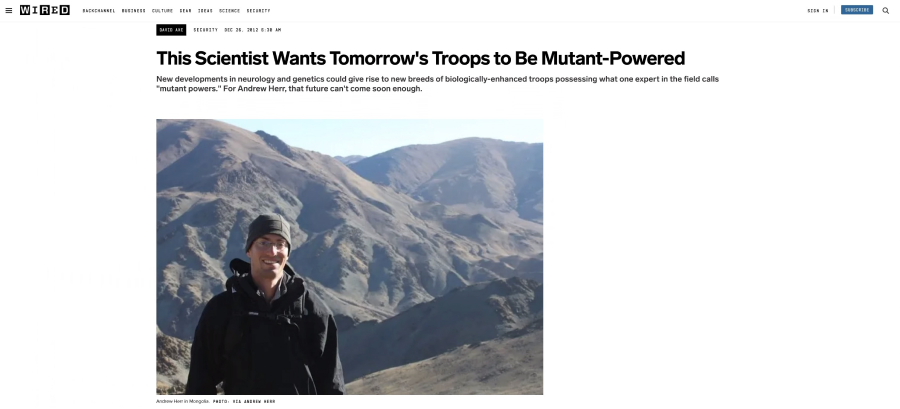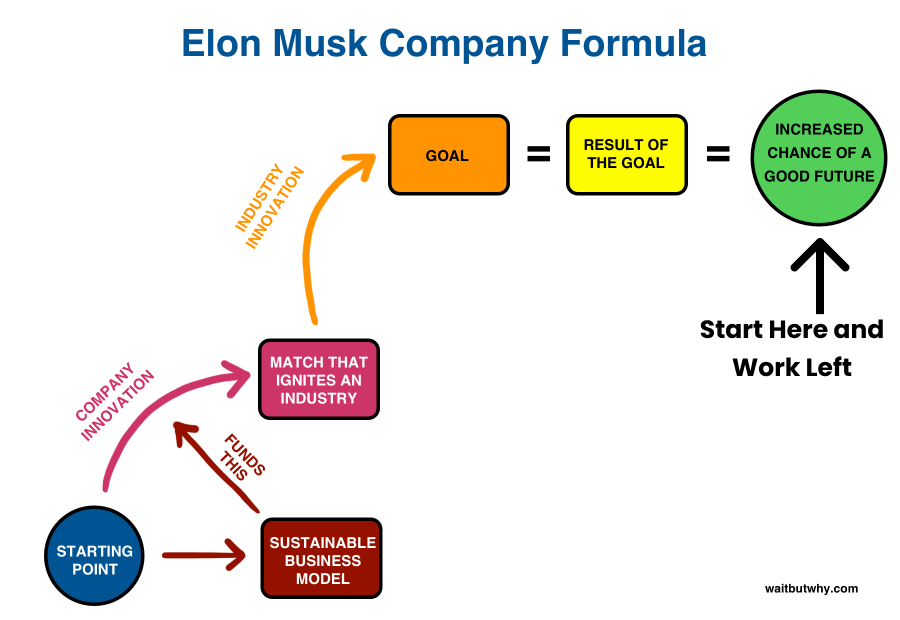Not Boring by Packy McCormick - Fount and the Body's Magical Future
Fount and the Body's Magical FutureThe Mad Scientist Running the Elon Musk Company Formula on Health & PerformanceWelcome to the 1,357 newly Not Boring people who have joined us since last Monday! Join 108,068 smart, curious folks by subscribing here: 🎧 To get this essay straight in your ears: listen on Spotify or Apple Podcasts (soon) Today’s Not Boring is brought to you by… Composer We all love Warren Buffet, but trying to “be greedy when others are fearful” is easier in theory than practice. In the market we’re in, removing emotion is key… but hard for us humans. Thankfully, there’s Composer - a platform for creating and investing with rules-based trading strategies. It's basically algo-trading without Python or Excel. They have dozens of pre-made investing templates, but what's really cool is that you can edit those templates or build your own strategies from scratch, backtest them, and then invest. You can edit their "Buy the Dips Nasdaq" template to only buy the top 20 holdings if they were up over 30% last quarter and rebalance every two weeks. Or, build your own strategy to execute paired switching trades between QQQ, USO, and Bitcoin ETFs - no code required. Long time Not Boring long distance reader Michael Batnick recently described Composer perfectly: “Composer removes the subjectivity of buying breakouts and then having to make decisions during the heat of the moment…I’m super pumped to see a tool like this available for investors.” I’m not only an investor in the company, but a long-time user of the product itself. Join me and sign up for free today* Fount and the Body’s Magical FutureYou can click the link above ☝️ to read the full thing online 🎩 Fount is crafting the operating system for the human body, the way Elon would. No one alive is better at explaining technology, humans, or Elon than Wait But Why’s Tim Urban. And it turns out, he has some thoughts on the kind of future Fount is building. In February, Urban went on the excellent Lex Fridman Podcast to discuss many topics, including his optimistic views on AI:
Around 1:37:00, Lex asks Tim, “You’ve been thinking about this AI safety question, where today does your concern lie, for the near-term future and the long-term future?” After acknowledging that humans aren’t that smart and are pretty easily manipulatable, which is scary, he said that he mostly gets excited about a lot of things, like having an AI assistant that can see into his body using wearables. I was tempted to include the whole transcription of his answer, but I footnoted it here and will use stick figures to explain instead: In case it’s not crystal clear from that drawing, here’s the gist. In the future, hardware like sensors in the bloodstream, infrared scanners, and Neuralinks will be able to measure what’s happening in our bodies in real-time, physically and even emotionally. We’ll all have our genomes sequenced and actually know how to use the information. We’ll be able to tell the AI our goals – more energy, lose weight, avoid cancer – and it will be able to do things like order “the perfect meal for that moment for me: for my mood, for my genome, for my blood contents” via drone, automatically. Most humans see a scenario in which computers know more than we do and tell us what to do as dystopian. He thinks they’re wrong. He thinks it sounds incredible:
I was running (NBD) when I heard that, and I nearly tripped. Tim Urban was laying out the precise thesis for a Not Boring portfolio company: Fount. The last time we’d spoken before I listened to that podcast, Andrew Herr, the wizard CEO and founder of Fount, described practically the same end-state that Tim did: “What people really want is to quickly and easily know what they should eat, take, and do to look, feel, and perform how they want.” Getting to that end-state has been the holy grail … or … fount ... of health and wellness for a long time. Nothing has come close to working at scale. One-size-fits-all solutions don’t work. Throwing a lot of poor quality data at the problem doesn’t work. The problem is that knowing about what’s going on in the body doesn’t yet tell you what to do. The body is so complex that we haven’t come close to modeling it yet (see: The Laboratory for Complex Problems for the category of problem we’re dealing with). As Andrew explained, even the gut is more complex than a rocket, let alone the brain, and the interactions among all of the different pieces compound the complexity. Rocket scientists at least have physics to guide them; we haven’t figured these rules out yet for the body. Gathering lots of poor quality data – observational studies, small clinical trials, even big trials that only look at one intervention – doesn’t capture the variability between humans or the synergies between different interventions. What’s needed is experimental data. As we’ll dive into, the path to personalized health recommendations at scale starts with recruiting thousands of people, running dozens of the right kinds of experiments on each person over a period of months to years (but different ones for each person), and gathering data continuously throughout the process so you have rich pre- and post- data sets for each experiment. If most clinical data collection is 5 question multiple choice, this approach is War and Peace-length choose-your-own adventure. Personalized health recommendations are the necessary first step towards the world Urban described, and towards healthier, happier people with less wasted healthcare spend, but collecting the data is so daunting that no one has even tried. Think about it:
I mean, put yourself in the question: how much would someone need to pay you to run dozens of experiments on you? $5,000 per month. No, sorry, that’s not my answer. $5,000 per month is how much clients pay Fount to run experiments on them and collect their data. Happily. (It drops to $1,000 per month after the three-month onboarding period.) Because Fount’s data collection mechanism is a world-class concierge wellness and performance coaching program developed by the guy who led human performance and biotech strategy efforts for the US Military and carried out by ex-Special Ops Performance Advisors. Fount flipped the equation on its head. Instead of applying for government grants to spend thousands per person recruiting participants and running studies on them, people are knocking down Fount’s doors and paying thousands of dollars for Fount to run experiments on them. If that strategy sounds familiar, that’s because it’s the Tesla playbook. Make something that’s good for the world so sexy that people line up to pay up. Like the Roadster, Fount’s price tag was a shock at first. It is … not approachable for 99.99% of people today. But it’s a best-in-class experience, and there are many people for whom the ROI is absurdly favorable. LeBron spends over $1 million on his body and mind per year, and he’s had to put a team of people together to pull it off. Fount does that all for you, so it's not only best-in-class knowledge, it's made for real people who can't focus on their body as their full time job. Especially when it's made easy, there's no shortage of people in tech, Hollywood, and pro sports willing and able to pay $24k to improve theirs. If you’ve made a lot of money in crypto but feel burnt out, for example, Fount might be for you. Shane Battier, an NCAA National Champion at Duke, NBA Champion with the Heat, NBA executive, and investor, who’s now a Fount client, told me why Fount makes sense for him:
The goal is much bigger than just serving the top 0.01%, though. Andrew could have done that on his own. Fount wants to help everyone improve their health and performance. To get there, the company plans to leverage the top end of the market’s willingness to pay for best-in-class service today in order to collect the data it needs to bring costs down to mass market levels over time. When a company starts ultra high-end to fund early production before ramping production and lowering costs, people always compare it to Tesla, like I just did. Usually, the comparison is full of shit, like when any money-losing company cites Amazon’s years of losses as justification. In this case, I don’t think that specific Tesla comparison goes far enough. Tim Urban's optimism on the Lex Fridman podcast isn't just about the technology - he believes that the way Elon Musk builds companies is key to upgrading the future. Fount is building in the same way. Five years ago, on 4/20 (woah 🤯) 2017, Urban wrote one of his all-time greats, the six-part, 36,027 word Neuralink and the Brain’s Magical Future. The essay is about Elon Musk’s brain-machine interface company, Neuralink, which Urban compares to a Wizard Hat. It spans an unbelievable range of complex topics – like how the brain works, how humanity compounds knowledge, and the framework behind all of Elon’s companies: the Elon Musk Company Formula. Fount is running the Elon Musk Company Formula on health. We’ll walk through each piece, but the result Fount is building towards is to dramatically increase the amount of human and financial capital going towards building a better future. It’s a non-obvious journey from a $5,000 per month Concierge plan to that goal, but that’s the point. If this were clear or easy, someone would have done it before. It’s a multi-trillion dollar opportunity that Andrew had just the right background to catch hiding in plain sight. I don’t take Elon Musk comparisons lightly. Fount is an incredibly special company run by a one-of-a-kind leader, and I think it has a chance to reshape wellness and healthcare. Today, I’ll explain:
To achieve its goal, Fount essentially needs to figure out how to put an enhanced Andrew Herr in everyone’s pocket. Tim Urban might call it Pocket Mad Scientist or Pocket Andrew. “I’m good at this. I’m one of the best in the world,” Andrew told me, “but this is going to be way better than me. That’s so fucking cool.” So let’s meet Andrew. The Mad ScientistThere are a lot of things in the Fount plan that might raise red flags 🚩: 🚩 Building an “operating system for the human body” sounds like one of those ideas that hundreds of entrepreneurs have tried, and failed, to pull off. 🚩 Starting with a $5,000 per month product and a hands-on approach feels like no way to scale. 🚩 Trying to replace primary care doctors with ex-Special Ops and an app is crazy. That’s why it’s important to get to know Andrew Herr first, before we get to the unbelievable stuff. Andrew is one of a very small handful of people in the entire world who could build this business. My friend Henry Ault, the co-founder and President of Eco and the person who introduced me to Andrew, co-led Fount’s pre-seed with Founders Fund. He shared the investment memo that he wrote at the time, in which he described Andrew’s upbringing and education:
After his full undergrad scholarship, Andrew won another $200k scholarship from the government to continue his studies with three concurrent masters: Microbiology & Immunology, Health Physics, and Security Studies. You can read the whole bio section from that memo here. The takeaway is this: Andrew was practically designed in a lab by the U.S. Government to build Fount and fix health and human performance at scale. When the Pentagon’s Office of Net Assessment needed to hire a researcher “who had a deep knowledge of biology, was just as deep in national security, who thought creatively, and could also write well,” he was one of the few people in the country with the right mix of skills and knowledge. He was hired after one interview, and while there, “started his decade-long project to understand what processes in the body he could tap into to materially enhance performance and which tools he could use to do this.” Over time, Andrew went from developing specific studies and programs to helping the Department of Defense leadership invest its multi-billion dollar R&D budget, with a focus on human performance, synthetic biology, and AI. All the while, he continued to work with Special Ops personnel – people for whom a .01% improvement in performance can be the difference between life and death - giving Andrew both the 30,000 foot view and the one inch view. After working with the military for eight years, Andrew entered the private sector in 2017. His accolades and accomplishments during and since are absurd. More are listed in the doc, but a couple:
Let’s put things in perspective here. The US Military’s annual budget in 2021 was $778 billion. Behind Social Security and Health spending, it’s the largest budget in the US, and the largest discretionary budget bar none, likely in the world. And the US Government chose Andrew to lead cutting edge human performance and biotech efforts for that military, putting the performance of the world’s most expensive and advanced soldiers in his hands. While the military is rigid in certain areas, it doesn’t subscribe to any orthodoxy when it comes to the performance of its soldiers. It’s the best-funded human performance lab in the world, and it offers an additional benefit beyond the money: soldiers who, unlike normal trial participants, want to comply with any programs or experiments that could enhance them. Andrew’s experience improving human performance from within the government’s third-highest spend category gave him the skills necessary to try to dramatically improve results and lower costs in its highest: healthcare. In 2019, he launched Fount to rethink health from the ground up. He’s raised money from funds including Founders Fund, Not Boring Capital, Allen & Co., and Elysian Park (the LA Dodgers’ fund), to tackle it. And – to use a very on-the-nose baseball pun – he’s in like the second inning. Fount as it stands today is just a way to fund the really big goal. The Elon Musk Company FormulaElon Musk hasn’t touched healthcare yet, but I imagine that if he did, it’s unlikely he’d try to fix it from inside the healthcare system. In the Neuralink post, Urban wrote about Musk’s new company thought process:
Fixing healthcare from the individual level up fits the bill. To learn more about the Elon Musk Company Formula, the biomedical data gap, my experience with Fount, how to scale from $5k/mo to <$100, and what the world looks like if Andrew succeeds…Try Fount For YourselfExperiencing Fount for yourself beats reading about it. If you have health and performance goals that you want to hit this year, it’s worth talking to the Fount team. To apply for the Fount Not Boring Scholarship, fill out this form: To skip the waitlist and talk to the Fount team about a personalized program: Thanks for reading, and see you on Thursday, Packy *Investing in securities involves risks, including the risk of loss. Composer Technologies Inc., SEC Registered RIA. If you liked this post from Not Boring by Packy McCormick, why not share it? |
Older messages
Flow: The Normie Blockchain
Monday, March 7, 2022
Zigging When Others Zag and Progressively Decentralizing to Win the Future
Ukraine
Monday, February 28, 2022
Resources, Links, and a Little Optimism
Wrangling Venture Entropy with Standard Metrics
Thursday, February 24, 2022
Quaestor Rebrands to Standard Metrics and Raises a $23.7M Series A
Web of Relations
Monday, February 14, 2022
Carlo Rovelli, Quantum Theory, and the Nature of Reality
Snappr: Building API-First, Last
Thursday, February 10, 2022
From Self-Service Photography Marketplace to Visual Content Workflow Software
You Might Also Like
🔮 $320B investments by Meta, Amazon, & Google!
Friday, February 14, 2025
🧠 AI is exploding already!
✍🏼 Why founders are using Playbookz
Friday, February 14, 2025
Busy founders are using Playbookz build ultra profitable personal brands
Is AI going to help or hurt your SEO?
Friday, February 14, 2025
Everyone is talking about how AI is changing SEO, but what you should be asking is how you can change your SEO game with AI. Join me and my team on Tuesday, February 18, for a live webinar where we
Our marketing playbook revealed
Friday, February 14, 2025
Today's Guide to the Marketing Jungle from Social Media Examiner... Presented by social-media-marketing-world-logo It's National Cribbage Day, Reader... Don't get skunked! In today's
Connect one-on-one with programmatic marketing leaders
Friday, February 14, 2025
Enhanced networking at Digiday events
Outsmart Your SaaS Competitors with These SEO Strategies 🚀
Friday, February 14, 2025
SEO Tip #76
Temu and Shein's Dominance Is Over [Roundup]
Friday, February 14, 2025
Hey Reader, Is the removal of the de minimis threshold a win for e-commerce sellers? With Chinese marketplaces like Shein and Temu taking advantage of this threshold, does the removal mean consumers
"Agencies are dying."
Friday, February 14, 2025
What this means for your agency and how to navigate the shift ͏ ͏ ͏ ͏ ͏ ͏ ͏ ͏ ͏ ͏ ͏ ͏ ͏ ͏ ͏ ͏ ͏ ͏ ͏ ͏ ͏ ͏ ͏ ͏ ͏ ͏ ͏ ͏ ͏ ͏ ͏ ͏ ͏ ͏ ͏ ͏ ͏ ͏ ͏ ͏ ͏ ͏ ͏ ͏ ͏ ͏
Is GEO replacing SEO?
Friday, February 14, 2025
Generative Engine Optimization (GEO) is here, and Search Engine Optimization (SEO) is under threat. But what is GEO? What does it involve? And what is in store for businesses that rely on SEO to drive
🌁#87: Why DeepResearch Should Be Your New Hire
Friday, February 14, 2025
– this new agent from OpenAI is mind blowing and – I can't believe I say that – worth $200/month

